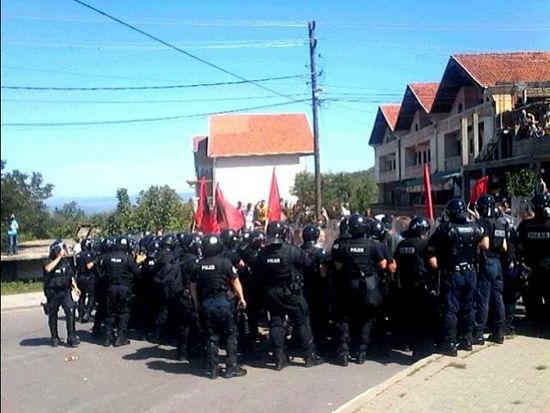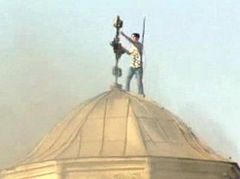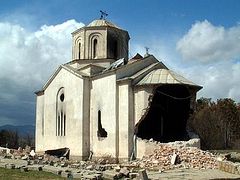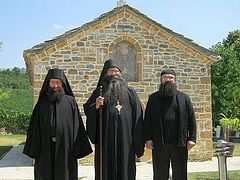Source: Balkan Insight
August 29, 2016
“The scenes from the village of Mushtisht are completely unnecessary and unacceptable,” said Kosovo President Hashim Thaci said in a statement after a protest by several hundred Albanians prevented some 150 Kosovo Serb pilgrims the visiting the Orthodox church in the village on Sunday.
“These actions are neither in the interest of Kosovo, nor in the interest of its citizens,” Thaci added.
The Kosovo Albanians gathered in the centre of the village and clashed with police who tried to secure a safe passage for the Serbs’ buses.
Protesters carrying banners with the slogan ‘KLA’ (Kosovo Liberation Army) threw rocks and bottles at the police. Several protesters were injured.
After several hours, the Serbs turned back because the police could not guarantee their security.
US and EU diplomats in Kosovo also condemned the violence.
“Strongly condemn using violence against police. Kosovo should be safe for all to practice their faith,” US ambassador Greg Delawie wrote on Twitter.
The EU office in Kosovo said it was “concerned over Mushtisht/Musutiste incident today, commends police for preventing injuries and material damages.”
It add that the office “understands war wounds, but respect for the right to return necessary for normalisation of relations in Kosovo”.
The head of the Serbian government office for Kosovo, Marko Djuric, argued that the unrest showed that Kosovo is far from a “multi-ethnic society”.
“Serbia doesn’t see anything normal in a mass manifestation of hate towards Serbs who just wanted to gather at the remains of their houses and church to pay respect. If Serbs are not even allowed to do that, how can we even talk about a future perspective in Serb-Albanian relations?” Djuric said.
Mushtisht/Mustiste, which was mixed before 1999 war, was the scene of deadly violence and human rights abuses during the conflict. Many Albanians from the village are still missing.
After the peace agreement which ended the war in 1999, the remaining Serbs in the village were expelled or fled in fear of retaliation.
Since then, they have not been able to return to the village or to visit the church and their relatives’ graves.
Thaci insisted that everyone has the right to return to their country of origin and their property.
“This applies for every citizen of Kosovo, regardless of ethnicity,” he said.
“The issue of the missing, the displaced and occupied properties are open wounds from the war. We must close these wounds as soon as possible and face the future,” he added.
Branimir Stojanovic, Kosovo’s deputy prime minister, who travelled in a bus with the Serb pilgrims, accused the authorities of capitulating to the violence.
Stojanovic insisted that despite the unrest, Kosovo Serbs would continue to try to return to their former homes.
“Displaced Serbs will be persistent in coming back to their homes and rebuilding their destroyed properties, as well as 11 Orthodox churches which they went to before 1999,” he said.
Djuric said meanwhile that Serbia had warned about possible violence last week after a local youth organisation from Mushtisht/Mustiste put up a billboard with photos from the Kosovo war, expressing discontent about the Serbs’ possible return to the village.
The billboard with images of people killed and houses burned by Serbian forces during the conflict was installed after ten Serb families asked to come back under a plan drawn up by the Kosovo ministry for returns.
In 2014, several hundred Kosovo Albanians protesting about missing persons from the 1990s war prevented a busload of Serbs from attending a church service marking the Orthodox holiday of Velika Gospojina in Mushtisht/Mustiste.
The protesters held up placards with slogans like “Where are the missing persons of Mushtisht?” and “There is no room for criminals in Mushtisht”.
Suhareka/Suva Reka and its surrounding villages, including Mushtisht/Mustiste, were heavily targeted during the conflict, and many people are still missing.
The International Criminal Tribunal for the Former Yugoslavia convicted six former Serbian officials of responsibility for wartime crimes committed during Kosovo war.
Serbian courts have convicted several people of committing crimes in Suhareka/Suva Reka.
Suhareka/Suva Reka police chief Radojko Repanovic and police officer Sladjan Cukaric were sentenced to 20 years in prison for their involvement.
Police officer Miroslav Petkovic and state security official Milorad Nisavic were given sentences of 13 and 15 years respectively.
However, no one has been prosecuted for the crimes committed in Mushtisht/Mustiste.
The return of some 200,000 Serbs who fled Kosovo after the war ended in 1999 has been slow, and so far only around 10,000 of them have gone back.





